Understanding Ramadan Timings in Dubai
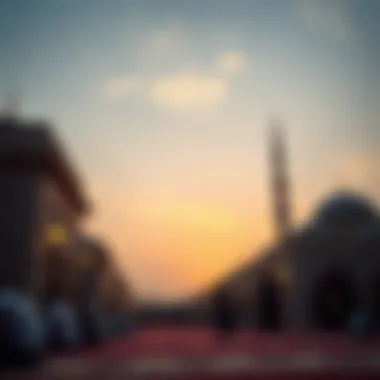
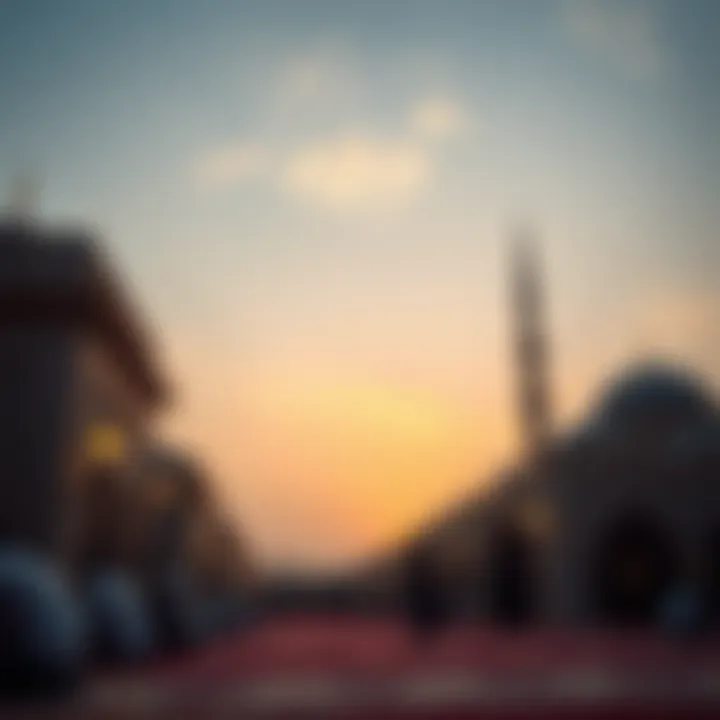
Intro
Ramadan is one of the most sacred months in the Islamic calendar, celebrated with immense devotion and spiritual depth across the globe. In Dubai, this period takes on a unique vibrancy, blending traditional practices with the emirate's modernity. Visitors and residents alike find themselves immersed in a world shaped by prayer, discipline, and a sense of community.
The essence of Ramadan goes beyond mere fasting; it is a time for reflection, prayer, and connection with one another. Those who live in or travel to Dubai during this holy month will experience first-hand the significance of daily rituals and activities that punctuate the days and nights.
Understanding the timings related to prayers, iftar, and suhoor is crucial. It is not just about observing the fast but also about participating in the broader cultural practices that define the month. This narrative aims to provide a clear understanding of these timing intricacies, as well as insights into the associated cultural practices that truly enhance the essence of Ramadan in Dubai.
As we delve deeper, this guide will cover the significance of fasting during Ramadan, key prayer schedules, and practical tips for navigating this period. Whether you are an expatriate, a homeowner, or a visitor looking to appreciate the richness of this time, appreciating the timing of events will greatly enhance your experience in this dynamic city.
Let's explore the various aspects of Ramadan, beginning with the foundational timing components that shape daily life during this month.
Preamble to Ramadan in Dubai
Ramadan, the holy month of fasting for Muslims, holds a revered place in Dubai's cultural and spiritual fabric. For residents and expatriates alike, understanding this month goes far beyond mere dietary restrictions; it is a time of reflection, devotion, and community connections. Discussing Ramadan in the context of Dubai helps to illuminate the unique practices and observances that shape life in this bustling city during this sacred period.
One key aspect to grasp is the importance of prayer timings during this month. Fasting begins with the pre-dawn meal, known as Suhoor, and ends at sunset with Iftar, the evening meal. These rituals underscore not just individual piety, but communal solidarity as well. Timings shift daily due to the lunar calendar, so familiarity with prayer schedules is essential, ensuring that all involved can navigate their day efficiently.
With a diverse population, Dubai showcases how Ramadan can accommodate both devout practitioners and individuals less familiar with Islamic traditions. For investors, agents, expatriates, or homeowners, understanding the significance of Ramadan is pivotal; it affects business hours, interactions, and the overall atmosphere of the city.
Moreover, this month acts as a reminder of compassion and charity, as many residents engage more deeply in giving back to the community, reinforcing ties among various cultural backgrounds. Familiarizing oneself with Ramadan in Dubai can foster a greater appreciation not only of the local customs but also of the lessons this month imparts.
“Ramadan is not just about abstaining from food; it represents a holistic approach to personal growth and communal unity.”
In the following sections, we’ll delve deeper into specific components of Ramadan in Dubai, focusing on key prayer timings and the routines that shape the experiences of everyone during this month. Gaining insights into these elements will enhance understanding and facilitate a more harmonious existence in the city when Ramadan arrives.
Official Ramadan Timings
Understanding the official Ramadan timings is crucial for those observing fasting during this holy month. Not just for the devout, these timings inform the daily routine of everyone living in or visiting Dubai, creating a collective experience enriched with both spirituality and community. It helps in fostering an environment where everyone can come together to respect the sanctity of this period.
Fajr Prayer Timing
Fajr, the first of the five daily prayers, takes place just before dawn. In Ramadan, it signifies the beginning of the fast for the day. The timing can shift daily, depending largely on the geographical position of Dubai and the progression of the season. This prayer is essential because it not only signifies the start of fasting but also sets the tone for the day ahead. Typically, the calls to Fajr can be heard from mosques throughout the city, inviting all worshippers to partake in this spiritual moment.
Fajr prayer often falls around 4:30 AM early in the month of Ramadan but can slightly shift towards 5 AM towards the end, reminding people that while the routines may change, the significance of this moment remains constant. Knowing the precise timing helps ensure that one doesn't miss the Suhoor meal – the pre-dawn meal that provides nourishment before fasting begins.
Maghrib Prayer Timing
As the sun dips below the horizon, it marks the moment of Maghrib prayer, which signals the end of the fast for the day. This prayer is typically performed at sunset, and in Dubai, it can range from approximately 6:40 PM in the early days of Ramadan to around 7 PM later in the month. Understanding this timing is especially significant because it is at this moment that families and friends gather for Iftar, breaking their fast together.
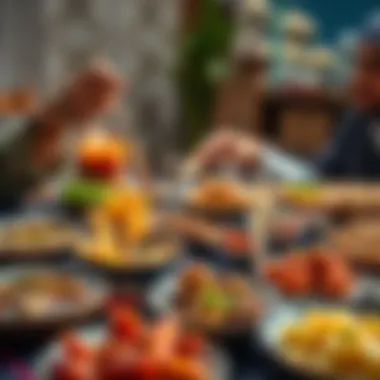
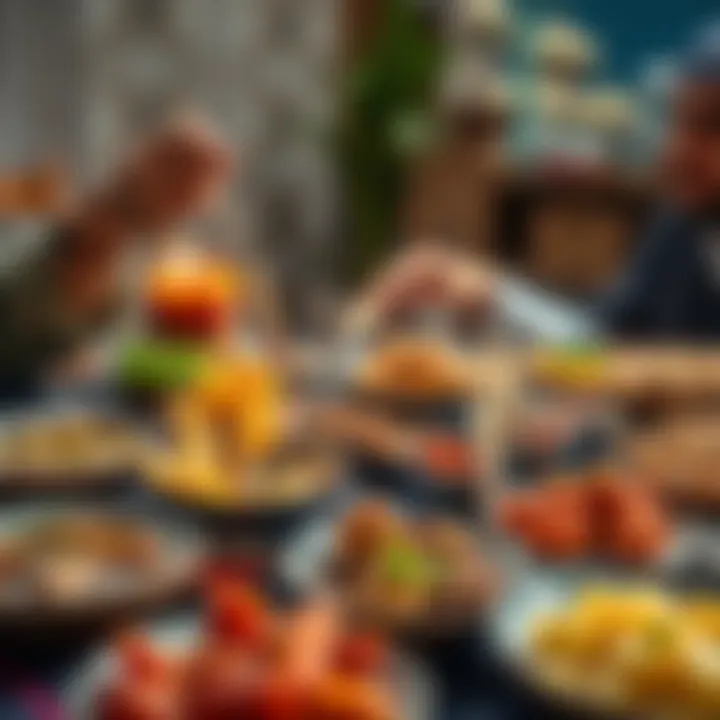
The sound of the call to prayer resonates throughout the city, creating a magical atmosphere as people rush to their homes, restaurants, or community centers to enjoy the evening meal. This moment is also a reminder of gratitude, as participants often reflect on their day of fasting, welcoming the opportunity to reconnect with loved ones over a hearty meal. Some popular dishes enjoyed during Iftar include dates, lentil soup, and traditional Arabian dishes.
Isha Prayer and Taraweeh
Isha prayer occurs later in the evening, following Maghrib. Its timing typically falls around 8:30 PM, but depending on daylight savings or the season, it may adjust. During Ramadan, the Isha prayer is followed by Taraweeh, special nightly prayers exclusive to this holy month. This is where the community really comes alive.
Taraweeh allows Muslims to reflect deeply on their faith and this additional congregational prayer extends well into the night. Many mosques in Dubai host large gatherings, where people come together, filling the sacred spaces with communal worship. The prayers can last until around 10 PM, and many congregants look forward to this time as a moment of connection, not just spiritually but also socially.
Understanding these timings is critical for anyone wanting to experience Ramadan in Dubai fully. It provides structure and allows participants to navigate their daily routines more effectively, ensuring respect is paid to these important prayer moments throughout the day and night.
Daily Routine During Ramadan
The daily routine during Ramadan is not just a series of tasks to tick off a list; it encapsulates a lifestyle deeply woven into the fabric of faith and community. In Dubai, where the blend of tradition and modernity often collides, the rhythms of life shift significantly during this holy month. For residents and expatriates, understanding this routine can enhance the spiritual experience and foster a stronger connection to local customs.
Pre-Dawn Meal (Suhoor)
Suhoor, the meal eaten before dawn, holds special significance, as it provides the necessary energy to sustain individuals through a day of fasting. It's not merely about fuel; it is about nourishment. This meal is typically consumed before the Fajr prayer, and its timing is crucial. A hearty suhoor could include an array of foods, from oats and yogurt to fruits and protein-rich dishes. These elements not only help stave off hunger but also contribute nourishment essential for a long day.
Keeping hydrated during suhoor is vital. Many folks in Dubai prefer dishes like ful medames or even lighter fare like dates with milk, which are wholesome and beneficial. The goal is to strike a balance that can sustain one's strength throughout the day while adhering to the fasting rules.
Importantly, the social aspect of suhoor can’t be understated. Many families gather together, making this meal a communal event. Sharing the pre-dawn meal could strengthen bonds and set a peaceful tone for the day ahead.
Evening Meal (Iftar)
Iftar occurs at sunset and signifies the end of the day's fast. The call to Maghrib prayer marks this moment, and it’s a time typically laden with anticipation. All over Dubai, you can see families and friends coming together to break fast, and often there's a diversity of dishes on the table. The traditional way to open the fast is with dates and water, following the Sunnah.
Dubai offers various outlets and restaurants that cater specifically to iftar, showcasing an array of local and international cuisines. From grilled meats to fresh salads, the evening meal serves not only as nourishment but an experience that fosters community, as people from all walks of life gather to celebrate.
Creatively prepared iftars highlight culinary excellence, and many hotels offer sumptuous buffet spreads, making it a chance to indulge as well. With a bustling atmosphere around iftar spots, it makes for a joyful occasion, reflecting the rich traditions that are part and parcel of Ramadan in Dubai.
Maintaining Energy Levels
Fasting throughout the day can test one's endurance, particularly in the warmer months. To keep energy levels stable, it’s important to approach food choices mindfully. Incorporating complex carbohydrates like whole grains during suhoor is advised, as they digest slowly and release energy gradually.
In iftar, while the temptation may be to celebrate with lavish meals, it’s smart to choose wisely. Balanced portions with proteins, healthy fats, and fibrous vegetables can help maintain sustained energy levels. Hydration should continue after iftar, as replenishing lost fluids is crucial. Drinking water intermittently until bedtime can aid in preventing fatigue.
Many find it helpful to engage in light activities or stretching after iftar, which allows for digestion while avoiding a heavy slump that can follow an indulgent meal. Keeping active, even in minor ways, can uplift the spirit and maintain alertness as the evening wears on.
As Ramadan progresses, it becomes clear that the daily routine is not a burden but a rhythm that enhances spirituality, strengthens community ties, and emphasizes self-discipline. Those who embrace the essence of the month can find these timeframes to be filled with deeper meaning and connection.
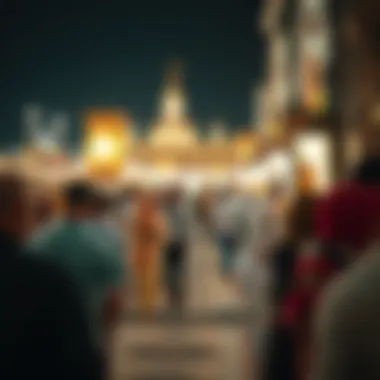
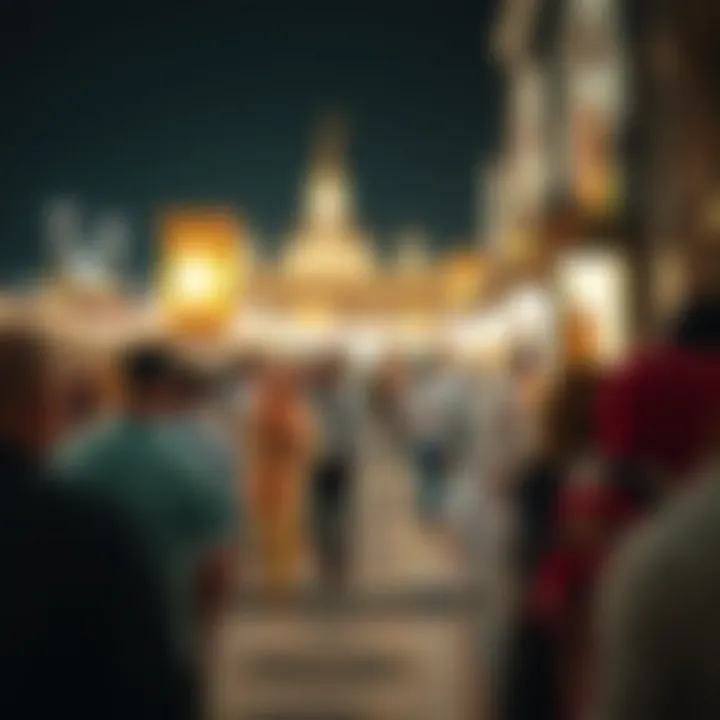
Community and Traditions
The month of Ramadan in Dubai represents more than just fasting; it embodies a period of togetherness, reflection and cultural connection. Community and traditions play an integral role during this sacred time, enhancing the experiences of both locals and expatriates. In a city famed for its diversity, Ramadan serves as a bridge, fostering interactions among various cultures while upholding age-old customs. Engaging in community activities during this month not only reinforces the bonds among families and neighbors, but highlights the beauty of multicultural coexistence that characterizes Dubai.
Celebrating Together
During Ramadan, the spirit of unity shines as brightly as the crescent moon. Families, friends, and even strangers come together, cherishing the essence of the month. One of the most notable customs is the breaking of fast, or iftar. In Dubai, this is often celebrated with large gatherings, where communal tables overflow with various traditional dishes. These meals become opportunities to strengthen relationships and share not just food, but stories and laughter.
The act of celebrating together during iftar strengthens social ties and promotes a sense of belonging. It’s common to invite neighbors, coworkers or new acquaintances for the meal, breaking down barriers and building friendships. This sense of community helps expatriates feel more at home in a city that sometimes can feel overwhelming due to its pace and modernity.
Dubai's atmosphere becomes charged as restaurants offer special iftar deals, and parks arrange large outdoor dinners to welcome anyone wishing to join in. People often say it’s as if Dubai itself takes a deep breath during Ramadan, slowing down to embrace moments of togetherness and shared joy.
Cultural Events in Dubai
The cultural landscape of Dubai transforms during Ramadan, with events laden with traditional elements and contemporary touches. Markets spring up, showcasing not just local crafts but culinary delights that one can only savor during this month. From the Arabic sweets like kunafa to savory dishes such as dates and harira, these offerings reveal the region's heritage and serve as a reminder of the importance of sharing.
As part of these cultural festivities, many organizations host community events, which can include Quranic recitations, lectures on Islamic teachings, and art exhibits that reflect the spirit of Ramadan. These gatherings are often open to both Muslims and non-Muslims, encouraging intercultural dialogue and understanding.
Moreover, the Dubai Festival City and Dubai Mall frequently organize special Ramadan-themed events that attract both residents and tourists alike. These gatherings often feature music, cultural performances, and presentations aimed at educating others about the significance of this holy month. Such initiatives not only foster community spirit but also promote cultural exchange amid the hustle and bustle of city life.
"Ramadan is not just about refraining from food and drink; it's about enriching the soul and elevating community well-being."
Guidelines for Non-Muslims
Navigating Ramadan in Dubai can be a unique experience, particularly for non-Muslims. Understanding the guidelines surrounding local customs is essential not just for fostering respect, but also for enhancing one’s overall experience during this significant month. As visitors or residents of Dubai, being aware of these guidelines can help cultivate a harmonious atmosphere, encouraging positive interactions between cultures.
Respecting Local Customs
Observing Ramadan in Dubai involves more than knowing the prayer times or noticing the bustling streets at night. Respecting local traditions is paramount in this diverse city. This holy month calls for more than abstaining from food and drink during daylight hours; it requires a mindful approach to behavior in public spaces.
- Eating and Drinking in Public: Non-Muslims are highly encouraged to refrain from eating, drinking, or smoking in public during daylight hours. While it may seem merely an inconvenience, this practice signifies respect for those observing the fast. Some cafes and restaurants in Dubai offer discreet indoor dining for those not fasting, so it’s wise to check local options.
- Dress Code: Modesty in clothing goes a long way in showing respect. While Dubai is quite liberal compared to other Middle Eastern cities, dressing modestly during Ramadan is a reflection of the culture and appreciates local sensibilities. Short shorts and revealing tops may not be received warmly during this time—long trousers and sleeves for both genders are a good practice.
- Tone and Volume: Maintaining a low profile, especially through noise levels, is another aspect worth acknowledging. Celebrations and gatherings can be commonplace after sunset, but during fasting hours, keeping conversations quiet and unruly behavior at bay is generally appreciated.
By adhering to these guidelines, non-Muslims can better integrate into the vibrant atmosphere of Dubai during Ramadan, showcasing a commitment to cultural understanding. This respects them, and it may open doors to meaningful connections and insights into local customs.
Participating in Iftar
Iftar, the evening meal to break the fast, is a unique opportunity for non-Muslims to engage with the local culture. It goes beyond satisfying hunger. For many, it symbolizes community, generosity, and the spirit of togetherness. Embracing this occasion can foster camaraderie and bridge cultural divides.
- Invitation to Share a Meal: If possible, accepting invitations to partake in Iftar gatherings is a wonderful way to immerse oneself in the local experience. Friends, coworkers, or neighbors may invite you to break their fast, and this fellowship can create lasting bonds. Often, hosts express their hospitality by preparing a lavish spread that showcases traditional dishes.
- Eating Etiquette: Understanding the customs during Iftar shows respect. Meals typically begin with dates and water, in line with tradition. Here, joining in begins with sharing these first bites, or simply offering a warm smile and appreciation to your host. It’s an act that echoes the essence of Ramadan—appreciation and gratitude.
- Community Iftar Events: Many places in Dubai hold community Iftar events to encourage inclusivity. From hotels to cultural centers, these gatherings welcome everyone. Joining such events can not only satisfy your appetite but also shine a light on cultural festivities, like community prayers afterward and various Halal dishes that might pique your interest.
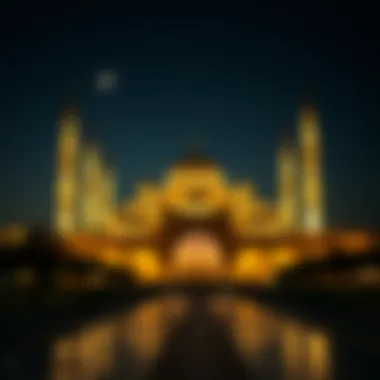
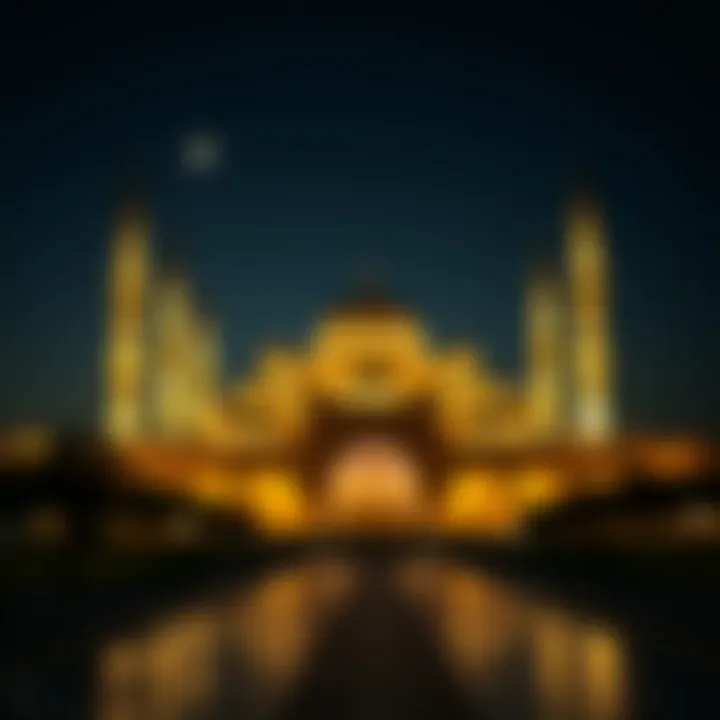
By participating in Iftar, non-Muslims have a chance to learn, understand, and appreciate the deeper meanings of Ramadan, contributing to a shared experience that honors the richness of diverse cultures in Dubai.
"Engagement during Iftar allows for a celebration of peace and togetherness across communities."
Overall, following these guidelines and engaging authentically during Ramadan in Dubai enhances not just personal experiences but enriches communal relations, providing a profound understanding of this holy month.
Health Considerations
Understanding health considerations during Ramadan is crucial for anyone observing the fast, especially in a bustling city like Dubai. The effects of fasting on the body can vary greatly from one individual to another, and thus awareness of hydration and nutrition becomes paramount. This section provides a closer look at these two elements, emphasizing their relevance to both the mind and body while fasting.
Hydration and Nutrition
Staying properly hydrated and maintaining a balanced diet during Ramadan can be quite challenging, particularly due to the extreme heat often experienced in Dubai. Hydration should ideally begin before Ramadan even starts, gradually increasing water intake in the days leading up to the holy month. Once Ramadan begins, water consumption has to be focused around the non-fasting hours. For instance:
- Drink plenty of water during Suhoor: Since it’s the last meal before dawn, include foods with high water content like cucumbers or melons.
- Avoid diuretics and caffeine: Be mindful that beverages like coffee may lead to increased urination, which can cause dehydration.
- Break your fast with water: At sunset, it’s common to have dates to break the fast, but first, quenching thirst with a glass of water is wise.
The nutritional aspect is equally significant. During Suhoor and Iftar, meals should include healthy carbohydrates, proteins, and fats to provide sustained energy. It is advisable to plan meals carefully so that:
- You include lean proteins, such as chicken or fish.
- Carbohydrates are whole grains or beans to sustain energy longer.
- Plenty of fruits and vegetables are included to supply essential vitamins and minerals.
Medical Advice During Ramadan
Consulting with a healthcare professional before embarking on a month of fasting is essential, particularly for individuals with existing health conditions or those taking medication. Here are some general recommendations:
- Seek personal medical advice: A doctor can provide personalized guidance based on your health history, particularly for those with diabetes, heart conditions, or pregnancy.
- Pay attention to your body's signals: If you feel dizziness, nausea, or extreme fatigue, it may be wise to break your fast. Health is the priority; being aware of your body can help you manage fasting more effectively.
- Consider modifications for specific health needs: Sometimes, alternative fasting options are available if traditional fasting isn’t feasible due to health concerns.
Fasting during Ramadan is not just about abstaining from food; it’s also about nourishing your body adequately and maintaining health.
Taking the time to understand hydration strategies and nutritional needs can contribute significantly to a fulfilling and healthy Ramadan experience. Therefore, embracing these elements helps not just in observing the fast but also enhances one’s overall well-being during this holy month.
Ending
In wrapping up the discussion on the intricacies of Ramadan in Dubai, it becomes clear that this holy month is rich in practices and customs that extend beyond mere fasting. Understanding the timings for prayer, meals, and community activities not only facilitates adherence to the spiritual aspects of the month but also fosters a sense of belonging among Muslims and non-Muslims alike who participate in this unique cultural experience.
Reflection on Ramadan's Impact
Ramadan offers individuals an opportunity for reflection, emphasizing the importance of self-discipline and empathy. While participating in daily fasts, people re-evaluate their daily routines. The timing for Fajr and Maghrib prayers does not just dictate when one can eat but also serves to synchronize lives, bringing communities together at dawn and dusk. It emphasizes a deeper connection, not only to one’s faith but to the broader community.
This month also encourages a spirit of charity and generosity, which plays a crucial role in fostering societal bonds. Whether it’s through donating to those in need or sharing meals during Iftar, the impact radiates beyond individual households, altering the social fabric positively.
In Dubai, the effects ripple further. As it’s a melting pot of cultures and nationalities, Ramadan provides a platform for engagement and deeper understanding. Organizing events that focus on shared values helps diminish barriers and enriches intercultural dialogues, making the city a beacon of unity during this holy period.
Ending Ramadan and Celebrations
As the fasting month concludes, Eid al-Fitr emerges as a jubilant celebration marking the end of Ramadan. The significance of this festival extends to social gatherings, prayers, and feasting, solidifying the community spirit. On the final evening of Ramadan, community activities such as evening prayers at mosques become a hub of collective joy, symbolizing gratitude for the strength shown throughout the month. Families come together, often willing to spend significant sums on gifts and gatherings, enhancing the festive mood.
Moreover, Dubai showcases dazzling events during this period, transforming public spaces into vivid displays of lights and festivities, inviting people from all walks of life to join in the revelry. Special iftar events, communal prayers, and charity drives ensure that the transition out of Ramadan is seamless yet impactful, reminding everyone of the lessons learned throughout the month.











